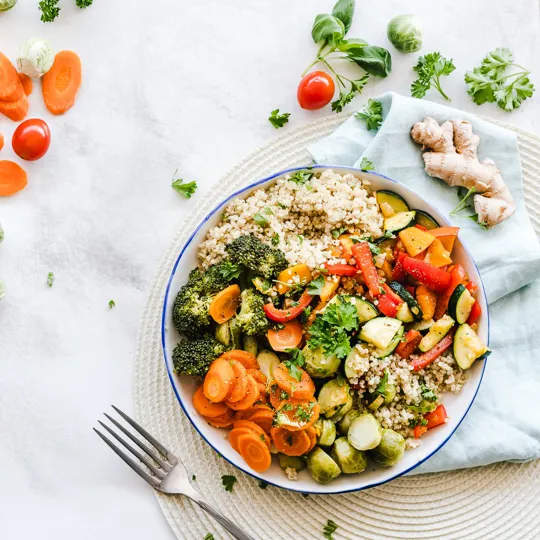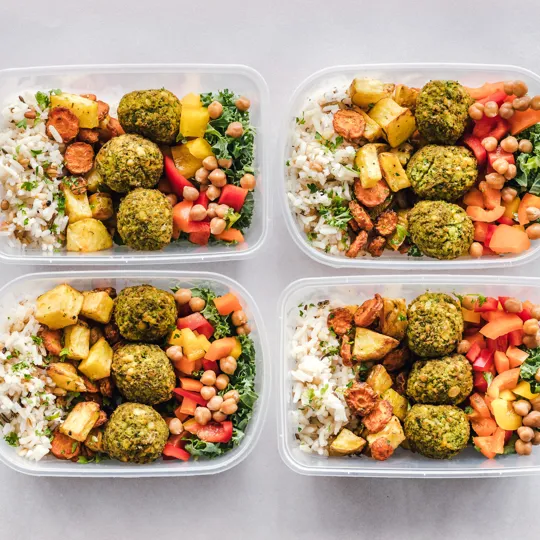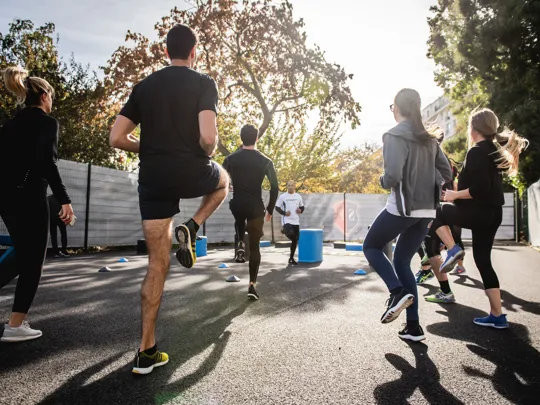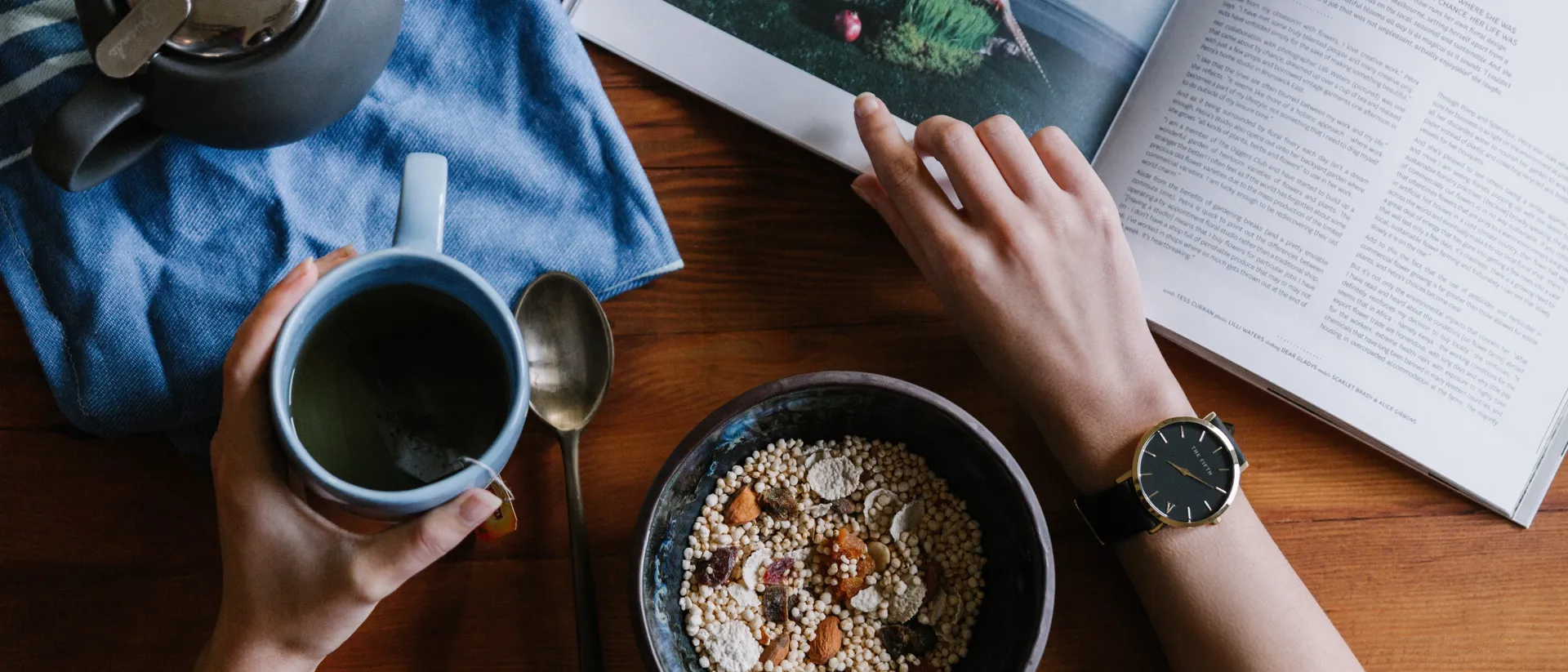Helping you learn well by living well
Studying at university represents a major change to your lifestyle. You will have new routines, challenges and responsibilities, and if you are living away from home for the first time, it's important to make sure that you learn to look after yourself.
To help you live well and learn well, we've prepared some useful tips and advice to help you maintain a healthy lifestyle during your time at university, covering everything from eating a balanced diet to how to get a better night's sleep.

Healthy eating
University is an exciting time. You will have a lot more independence and more control over your diet and what you eat.
Although eating a healthy, balanced diet might not be at the top of your agenda, it is important not just for your physical health, but your mental health too!
So what does a healthy, balanced diet look like?
Eating a variety of fruit and vegetables is important for a healthy, balanced diet, and we should be eating at least five portions each day. If you are wondering how much a portion is, it's about a handful (or 80g to be precise).
Eating a variety ensures that you get all of the vitamins and minerals your body needs to function optimally, and frozen and canned fruit and vegetables are also great options that can sometimes be cheaper and can be stored for longer too! (Just watch out for those with added sugar or salt).
Although a small glass (150ml) of fruit juice or smoothie does count as one of your five-a-day, it is high in free sugar, so best to stick to just one glass a day!
It is recommended that we eat a diet that is based on starchy carbohydrates such as breads, potatoes, pasta, rice and other cereals. We can boost our fibre intake as well as other vitamins and minerals by choosing wholegrain varieties or eating potatoes with their skins left on. Approximately one third of our diet should come from starchy carbohydrates.
To ensure we are hitting our protein requirements, we should try and have some within each meal. Sources include those that are plant-based – such as lentils, beans, tofu, seeds and quinoa – or lean meat and fish and eggs. It is recommended that we reduce our red and processed meat intake and have fish twice a week, including 1 portion of oily fish such as salmon, trout, sardines or mackerel (again canned and frozen still count and are sometimes cheaper!)
Including moderate amounts of low-fat dairy products such as yoghurt, cottage cheese and semi-skimmed milk is recommended, as they are great sources of protein and calcium. For those that avoid dairy for various reasons, ensure the alternatives are fortified so you aren't missing out on important nutrients, and choose the no added sugar varieties.
We should limit the amounts of food high in saturated fat, salt and free sugars, replacing foods high in saturated fat with unsaturated fat food sources like oily fish, nuts and olive oil.
For more information on how to achieve a healthy, balanced diet, please visit The Eatwell Guide.

Top tips
Plan ahead – Write a shopping list each week to give you an idea of what you need and how much you need to spend.
Shop around – If you have access to a larger supermarket then this might be cheaper than the local ones. Choosing their own products rather than big brands might also save you a few pennies. There are a few local markets in Birmingham city centre and surrounding areas too, such as Kings Heath and Moseley, that you might want to try.
Shop seasonally – Shopping for foods that are in season can make your meals tastier, more nutritious and also cheaper! Find out what’s in season here.
Batch cook – Cooking meals in batches, such as a chilli con carne or a curry, can save time and money. Freeze the rest for later!
Cook from scratch – Cooking from scratch instead of buying ready meals and takeaways is cheaper and better for you. There are plenty of recipes to follow online, but here are a few of our favourite pages: bbcgoodfood.com, whisk.com, studentrecipes.com, allrecipes.com.

Exercise
We should all be doing some type of physical activity every day. Whether this be a brisk walk to lectures, taking the stairs instead of the lift, or taking part in sports such as football, rugby or netball – check out our societies here.
It is recommended that we should do at least 150 minutes of moderate-intensity activity a week, or 75 minutes of vigorous-intensity activity, including some strength exercises too. Reducing the amount of time we spend sitting down is key to improving our overall health and happiness.

Sleep
Sleep is essential and allows your body and mind to recharge so you feel ready to take on another day! Lack of sleep can cause your body and brain to not function properly, and also increases your risk of other illnesses.
Here are some tips for a better night's sleep:
Routine – Develop a relaxing sleep routine before bed. This might include a warm bath, meditation or a cup of camomile tea – whatever works for you! Try and go to bed at the same time every night.
No caffeine after 2pm – Caffeine may be in your system for several hours, making it harder to drift off.
Avoid alcohol – It might relax you, but you are likely to have a poor night's sleep and won't wake up feeling refreshed.
Avoid nicotine – Nicotine can make falling asleep difficult, cause you to wake up often, or have a poor night's sleep.
Screen time – Avoid TV, music and looking at your phone, laptop or tablet at least 30 minutes before bed. You could try reading a book instead.
Regular exercise – Studies have shown that those who regularly exercise tend to sleep longer, wake less often and feel less tired when they wake up than those who don’t.

Drinking responsibly
Although there are more and more students making positive decisions regarding their drinking, University life is still associated with excessive alcohol consumption, which can negatively impact your health, wellbeing and academic performance.
The NHS recommends that people (both men and women) do not drink more than 14 units of alcohol a week. If you’re not sure what this means then check the label for ABV % and you can work it out like this: (Volume) x (%) / 1000 = Units.
If you are worried about your levels of alcohol consumption then you can take the Drink Aware self-assessment here. You can also explore these other useful links: drinkaware.co.uk, nhs.uk, alcoholconcern.org.uk, talktofrank.com
Smoking
For support to help you quit smoking, visit the NHS for links to resources and help: nhs.uk/stopsmoking, nhs.uk/smokefree
Discover more

Disability and neurodiversity support
We are committed to providing an inclusive learning environment, and our DNS team is here to advise you and provide assistance throughout your studies.
Read more
Student support
Whether you need support with your learning, finances, health and wellbeing or other areas, our range of dedicated support services are here for you.
Read more
Financial support
While studying, it is important to manage your finances and access any help to which you are entitled. Our staff are here to give you the support and advice you need.
Read more
Disability support – mental health
The term 'disability' can encompass mental health difficulties. Telling us about a mental health condition enables us to fully support you during your studi…
Read more
Supporting a friend or family member
Seeing our children, friends or family members struggling with their mental health can be tough. Find a range of help services and advice for supporting o…
Read more
Student Engagement Team
As a hub of student support, the student engagement team uses its platforms as a way of bringing the community at University College Birmingham together.
Read more
Support resources
Our health and wellbeing team have put together a list of wellbeing resources that you can use independently, including helplines, websites and leaflets.
Read more
Specialised Accommodation
The Accommodation Service at University College Birmingham are available to offer support for anyone that requires an adapted room
Read more